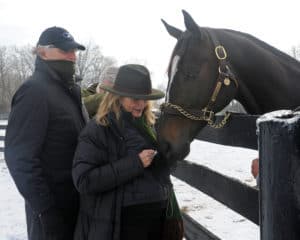Additional Tennessee Horses Confirmed Positive for EHV-1
Five additional horses at the index case’s home premises have tested positive for EHV-1 and are being treated.

Five additional horses at the index case’s home premises have tested positive for EHV-1 and are being treated.

Learn about the basics of equine genetics and the different applications they have in equine performance.
The tenth anniversary of the Sept. 11 terror attacks was observed in an unsuspecting–and completely unplanned–manner at one New York racetrack. According to an article
No new EHV-1 cases have been confirmed at UT. The informational forum will take place Sept. 21 at 7:00 p.m.
Seven California horses have now tested positive for WNV, and an EEE case has been detected in Wisconsin.

An EHV-1 positive horse was admitted last week. No new cases have emerged at the medical center to date.

Horse owners in the South are faced with “exceptional” droughts and high hay prices as the drought continues.

Seven horses from one farm and two residing on another premises have tested positive for neurologic EHV-1.
Researchers review the characteristics and impact of epiglottic abnormalities in nonracehorses.

Researchers in the Netherlands have completed further research into developing an effective vaccine for the bacteria Rhodococcus equi, which is known to cause pneumonia and other sometimes fatal infections in young foals.

Jerry and Ann Moss discuss life before Zenyatta, the journey the big mare, and plans for “Baby Z.”

Nutritional support could reduce the stresses and health challenges that weaning places on young horses.
Eight additional horses in Tuolumne County are displaying clinical signs consistent of EHV-1.
A new case of neurologic EHV-1 was confirmed in California on September 12.

Certain parts of the horse’s digestive tract are associated with higher risks of developing colic.
All horses originating from Texas must be accompanied by proof of a negative EP test to enter Kentucky.
Stay on top of the most recent Horse Health news with